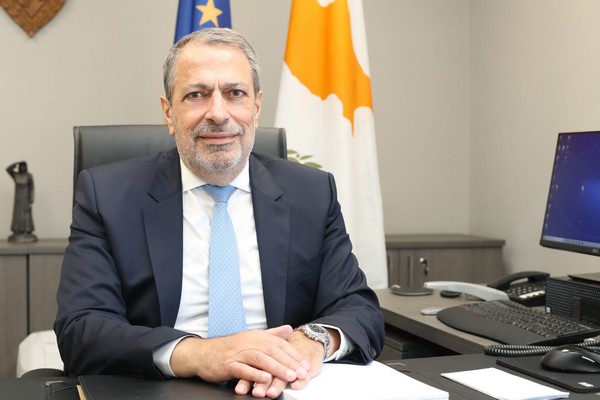Press Releases

03-06-2024 10:20
Address by the Attorney-General of the Republic, Mr George L. Savvides, at the international conference on “Militant Democracy and Constitutionalism: Do procedural aspects of democracy affect its substance?”
It is with great pleasure that I have accepted the kind invitation to participate in today’s Conference. Allow me to begin by welcoming all of you in Cyprus and by congratulating the organisers for putting together such an impressive programme on a subject that is of particular interest. What makes this occasion even more noteworthy, is that the Conference takes place in honour of a very distinguished predecessor of mine, the late Alecos Markides, who dedicated his life in serving democracy and the Constitution of the Republic of Cyprus, as a lawyer, as Attorney General, and as a politician.
The late Alecos Markides was, apart from one of the most respected lawyers in the contemporary legal history of our state, a rare combination of a jurist and political thinker, being versatile enough to alternate those roles with ease and to employ diplomacy, political and legal skills simultaneously when required. He was distinguished by his ethos and dedication to duty. His years in office and in the practice of law are defined by his integrity and staunch adherence to the goal of reaching a just and viable settlement to the Cyprus problem, that guarantees the rights of all Cypriots. Alecos Markides always considered that the resolution of the Cyprus problem was a prerequisite for the development and prosperity of our country. At the same time, he particularly valued the contribution that younger generations could have to democratic dialogue and in that respect, he was also involved, for many years, in training aspiring lawyers by teaching constitutional law to candidates to the Cyprus Bar, from whom he enjoyed immense respect for his knowledge and insight. In effect, he shaped the perspective new lawyers joining the profession had on constitutional law.
I had the privilege and the honour to meet the late Alecos Markides on a number of occasions and under his different capacities. A true gentleman, a down-to-earth man, friendly, one of the most intelligent and knowledgeable persons I have ever come across.
It is for all the above reasons that Alecos Markides would have found today’s Conference particularly intellectually stimulating, and this makes his absence even more conspicuous today. It is no doubt that the presentations to be made will raise significant points for discussion, debate and a fruitful exchange of ideas.
As civil society keeps reforming and reinventing itself, particularly in recent years with the use of technology in the exercise of state functions and public dialogue, new challenges arise. Such challenges include misinformation and disinformation, as it has been noted by the European Union as well. Unfortunately, technology can be used for misinformation and the dissemination of illegal content. However, digital means should not be employed to convert media to an arena of political disputes, or hate rhetoric, unduly influencing public opinion and seeking to substitute democratically elected institutions.
Representative democracy is exercised through the constitutionally provided procedure of election and decision-making is carried out by elected representatives who enjoy a solid democratic mandate. We should, therefore, safeguard constitutional principles and democratic processes. I am certain that in line with the topics of this conference, the various methods of achieving these objectives will be analysed and assessed. Such an assessment is without doubt necessary to achieve the objective of protecting the core of democracy, which is that citizens must have the right to express themselves and their elected representatives respond to that need.
It would be an omission not to refer to the role that independent offices play in protecting the rule of law and democracy in a system of governance, including the Law Office of the Republic, which I have the honour to lead. These institutions, being independent from any branch of government and free from political interference ensure that the principles of democracy are upheld and bring to light issues of great constitutional importance. Our Office, according to its competences, is a watchdog of the Constitution, ensures the legality of governmental action and constitutes an essential part of the administration of justice, thus upholding the rule of law, fundamental rights and by extent, democracy.
Ladies and gentlemen,
In the span of two days, those who participate in this conference will have the chance to hear about intricate legal concepts and political philosophy. They will also have the opportunity to see presentations on matters that are high on the political agenda and public dialogue, such as the rise of populism, restrictions on political parties and the freedom of expression. In this respect, I can only congratulate the School of Law of the University of Nicosia and the Themistocles and Dimitris Tsatsos Foundation-Centre for European Constitutional Law for truly reaching out and drawing in such a diverse group of distinguished scholars from all corners of the world.
I am, therefore, confident that this event will set high standards for academic conferences on legal and political themes in Cyprus, and on an international level as well. It is on rare occasions that such a range of topics is discussed in a multidisciplinary setting, and I therefore urge you to approach this exciting interchange with open minds and the will to learn and share knowledge. After all, such events are an opportunity for all of us, lawyers, institutions, and academics, to reflect upon the true meaning of democracy, to re-evaluate our actions and policies, find our bearings and focus once again on our basic principles.
Thank you for your attention.
(ML/MS)
Relevant Press Releases







